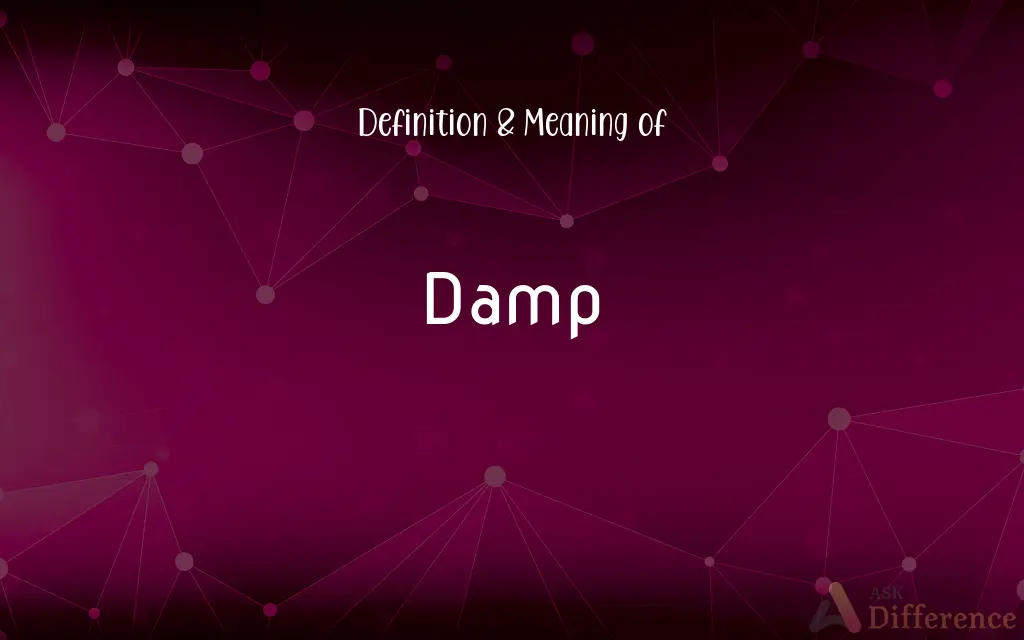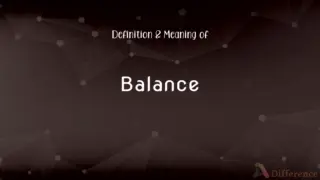Damp Definition and Meaning
By Urooj Arif & Tayyaba Rehman — Updated on March 5, 2024
"Damp" describes a slight wetness or moisture, often felt in the air or on surfaces. e.g., The morning dew left the grass damp and glistening.

Table of Contents
Damp Definitions
Damp means slightly wet or moist.
The towels felt damp after being in the humid bathroom.
Damp signifies being not completely dry.
Her hair was still damp from the shower.
Damp denotes a feeling of humidity or mugginess.
The damp air made the room feel cooler.
Damp implies slightly wet to the touch.
The grass was damp with morning dew.
Damp means having a slight chill due to moisture.
There was a damp chill in the air at night.
Damp refers to a slightly humid condition.
The damp climate affected the wooden furniture.
Slightly wet
A damp sponge.
Humid
Damp air.
(Archaic) Dejected; depressed.
Moisture in the air; humidity
Come in out of the damp.
Moisture that lies or has condensed on something
“I saw the damp lying on the bare hedges and spare grass” (Charles Dickens).
Foul or poisonous gas that sometimes pollutes the air in coal mines.
Lowness of spirits; depression
“An angry or sorrowful [countenance] throws a sudden damp upon me” (David Hume).
A restraint or check; a discouragement
“The issue of arms was so slow as to throw a great damp upon volunteering” (James Franck Bright).
To make damp or moist; moisten.
To suppress or extinguish (a fire) by reducing or cutting off air.
To restrain or check
News that damped our enthusiasm.
(Music) To slow or stop the vibrations of (the strings of a keyboard instrument) with a damper.
(Physics) To decrease the amplitude of (an oscillating system).
In a state between dry and wet; moderately wet; moist.
The lawn was still damp so we decided not to sit down.
The paint is still damp, so please don't touch it.
(figuratively) Despondent; dispirited, downcast.
Permitting the possession of alcoholic beverages, but not their sale.}}
Moisture; humidity; dampness.
(archaic) Fog; fogginess; vapor.
(archaic) Dejection or depression; something that spoils a positive emotion (such as enjoyment, satisfaction, expectation or courage) or a desired activity.
A gaseous product, formed in coal mines, old wells, pits, etc.
To dampen; to make moderately wet
To damp cloth
To put out, as fire; to weaken, restrain, or make dull.
(transitive) To suppress vibrations (mechanical) or oscillations (electrical) by converting energy to heat (or some other form of energy).
Moisture; humidity; fog; fogginess; vapor.
Night . . . with black airAccompanied, with damps and dreadful gloom.
Dejection; depression; cloud of the mind.
Even now, while thus I stand blest in thy presence,A secret damp of grief comes o'er my soul.
It must have thrown a damp over your autumn excursion.
A gaseous product, formed in coal mines, old wells, pints, etc.
Being in a state between dry and wet; moderately wet; moist; humid.
O'erspread with a damp sweat and holy fear.
Dejected; depressed; sunk.
All these and more came flocking, but with looksDowncast and damp.
To render damp; to moisten; to make humid, or moderately wet; to dampen; as, to damp cloth.
To put out, as fire; to depress or deject; to deaden; to cloud; to check or restrain, as action or vigor; to make dull; to weaken; to discourage.
Usury dulls and damps all industries, improvements, and new inventions, wherein money would be stirring if it were not for this slug.
How many a day has been damped and darkened by an angry word!
The failure of his enterprise damped the spirit of the soldiers.
A slight wetness
Deaden (a sound or noise), especially by wrapping
Restrain or discourage;
The sudden bad news damped the joyous atmosphere
Make vague or obscure or make (an image) less visible;
Muffle the message
Lessen in force or effect;
Soften a shock
Break a fall
Slightly wet;
Clothes damp with perspiration
A moist breeze
Eyes moist with tears
Damp refers to a small amount of moisture.
The basement walls were damp and cold.
Damp conveys a state of being mildly soaked.
The sponge was damp after being wrung out.
Damp suggests a condition of being lightly saturated.
His clothes were damp from the light rain.
Damp indicates a minimal presence of water or liquid.
The painter's cloth was damp with paint.
Damp Snonyms
Refuse
To indicate or show that one is not willing to do something.
He refused to answer the question.
Disclaim
To deny any claim to; disavow.
She disclaimed any knowledge of her husband's whereabouts.
Disavow
To deny any responsibility or support for.
The politician disavowed any connection to the scandal.
Repudiate
To refuse to accept; disown, renounce or deny support.
He repudiated the allegations made against him.
Decline
Politely refuse (an invitation or offer).
He declined the invitation to the party.
Contradict
To assert the opposite of a statement made by (someone).
She contradicted his claim with clear evidence.
Disown
To refuse to acknowledge or maintain any connection with.
He disowned his past mistakes.
Rebuff
To reject (someone or something) in an abrupt or ungracious manner.
His advances were rebuffed with a stern no.
Reject
To dismiss as inadequate, unacceptable, or faulty.
She rejected their offer.
Negate
To nullify; make ineffective or invalid.
His response was meant to negate the previous statement.
Damp Idioms & Phrases
Damp squib
Something that is less impressive or exciting than expected.
The much-anticipated movie turned out to be a damp squib.
Throw a damp
To discourage or put a stop to enthusiasm or excitement.
The sudden thunderstorm threw a damp on the outdoor party.
Damp enthusiasm
To lessen or reduce someone's enthusiasm or excitement.
The negative review damped the public's enthusiasm for the new product.
Damp out
To extinguish or reduce something.
The new regulations damped out any hope for rapid expansion of the business.
Catch a damp
To become slightly wet or to catch a chill.
He caught a damp walking home in the drizzle.
Damp the mood
To cause a mood to become less cheerful.
The news of the accident quickly damped the mood at the celebration.
In a damp
In a state of being slightly wet or moist.
They returned from their hike in a damp, having been caught in a light rain.
Put a damp on
To have a discouraging or subduing effect on something.
His critical comments put a damp on the entire project.
Damp down
To make less strong, intense, or active.
They tried to damp down the rumors before they spread further.
Damp spirits
A mood that is slightly depressed or not enthusiastic.
The continuous rain put a damp on everyone's spirits during the vacation.
Damp one's style
To inhibit someone's way of doing things or their enthusiasm.
The strict rules at the school damped his style.
Damp the fire
To reduce passion, enthusiasm, or excitement.
His calm demeanor helped to damp the fire of the argument.
A damp day
A day that is marked by wetness or moisture, often with a lack of enthusiasm.
It was a damp day, both due to the weather and their low spirits.
Damp with disappointment
Experiencing a slight feeling of disappointment.
Her face was damp with disappointment when she saw the results.
A damp blanket
A person who discourages enjoyment or enthusiasm.
Don't invite him to the party; he's such a damp blanket.
A damp outlook
A perspective that is not very hopeful or enthusiastic.
Despite the challenges, he tried to maintain more than just a damp outlook.
Damp one's hopes
To reduce the likelihood or enthusiasm for future success.
The team's loss in the first match damped their hopes for the championship.
Damp down the fire
To reduce the intensity or excitement of a situation.
The mediator worked to damp down the fire during the heated debate.
Feel damp
To have a sensation of being slightly wet or moist.
After the misty morning walk, her clothes felt damp.
Leave one damp
To leave someone feeling slightly wet, either literally or figuratively (as in enthusiasm).
The abrupt end of the concert left the audience damp.
Damp Example Sentences
The air felt damp and heavy this morning.
She wiped her face with a damp cloth.
The soil was damp after the rain.
The damp weather made her hair frizzy.
The towels in the bathroom felt damp.
He left the laundry outside, and it got damp.
The cave walls were cold and damp.
Her shoes were still damp from the puddle.
The damp ground was soft under their feet.
His jacket was damp from the misty air.
He noticed the damp pages of the book.
The dampness made the paper slightly damp.
She used a damp rag to clean the table.
The damp basement had a musty smell.
The damp grass clung to their shoes.
Common Curiosities
How is damp used in a sentence?
Damp is used as an adjective, e.g., "The towels were still damp after the rain."
Why is it called damp?
It is called damp from the Middle Low German word "damp," which means vapor or steam, used to describe something that is slightly wet.
How many syllables are in damp?
There is 1 syllable in "damp."
What is a stressed syllable in damp?
In the word "damp," the single syllable "damp" is stressed.
What is the verb form of damp?
The verb form of damp is "dampen."
What is the root word of damp?
The root word of damp is the Middle Low German word "damp," meaning vapor or steam.
What part of speech is damp?
Damp is an adjective.
How do we divide damp into syllables?
Damp is not divided into syllables as it is a single syllable word.
What is the first form of damp?
As an adjective, damp does not have verb forms. The base form of the related verb "dampen" is "dampen."
What is the second form of damp?
Damp is an adjective and does not have verb forms. The second form of the related verb "dampen" is "dampened."
Is damp an abstract noun?
No, damp is not a noun; it is an adjective.
Is the damp term a metaphor?
The word "damp" can be used metaphorically in certain contexts, but it is not inherently a metaphor.
What is the pronunciation of damp?
Damp is pronounced as /dæmp/.
What is the third form of damp?
Damp is an adjective and does not have verb forms. The third form of the related verb "dampen" is "dampened."
Is damp a negative or positive word?
Damp is generally neutral but can have a negative connotation depending on the context.
Is damp a vowel or consonant?
The word "damp" starts with a consonant.
Is damp a countable noun?
Damp is not a noun; it is an adjective and therefore not countable.
Is damp a collective noun?
No, damp is not a collective noun; it's an adjective.
Which determiner is used with damp?
Determiners like "a," "an," "the," or possessives like "my," "your," etc., can be used with "damp" depending on the noun it modifies, e.g., "a damp cloth."
Is damp an adverb?
No, damp is not an adverb.
Is the word damp Gerund?
No, "damp" is not a gerund; it is an adjective. The gerund form of the verb "dampen" would be "dampening."
Is damp a noun or adjective?
Damp is an adjective.
Is the word damp imperative?
Damp is not typically used in the imperative form; it is an adjective. The verb "dampen" can be used imperatively, e.g., "Dampen the cloth."
Is the word “damp” a Direct object or an Indirect object?
"Damp" is an adjective and does not serve as a direct or indirect object.
Which conjunction is used with damp?
Conjunctions are not specific to the word "damp" and depend on the sentence structure. Examples include "and," "but," or "or."
Which article is used with damp?
Articles are typically used with the noun that "damp" modifies, not with "damp" itself, e.g., "a damp towel" or "the damp air."
What is another term for damp?
Another term for damp is "moist."
What is the singular form of damp?
Damp is the same in both singular and plural forms; it does not change.
What is the plural form of damp?
Damp is the same in both singular and plural forms; it does not change.
What is the opposite of damp?
The opposite of damp could be "dry."
Which vowel is used before damp?
Typically, no vowel is used directly before "damp." Articles or determiners used depend on the noun that "damp" is modifying.
Which preposition is used with damp?
Prepositions used with "damp" vary based on context, like "damp from the rain" or "damp in the basement."
Share Your Discovery

Previous Term
Deny Definition and Meaning
Next Term
Balance Definition and MeaningAuthor Spotlight
Written by
Urooj ArifUrooj is a skilled content writer at Ask Difference, known for her exceptional ability to simplify complex topics into engaging and informative content. With a passion for research and a flair for clear, concise writing, she consistently delivers articles that resonate with our diverse audience.
Co-written by
Tayyaba RehmanTayyaba Rehman is a distinguished writer, currently serving as a primary contributor to askdifference.com. As a researcher in semantics and etymology, Tayyaba's passion for the complexity of languages and their distinctions has found a perfect home on the platform. Tayyaba delves into the intricacies of language, distinguishing between commonly confused words and phrases, thereby providing clarity for readers worldwide.




































